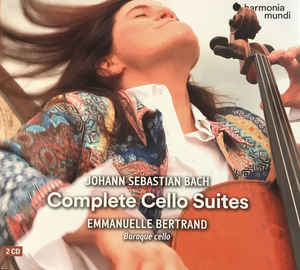
Emmanuelle Bertrand Bach Cello Suites. harmonia mundi HMM 902293.94
Released 2019.
Recorded February and March 2018 at Notre-Dame de Bon Secours Paris.
Recording played on cello by Carlo Tononi with gut strings, Baroque bow by Rene-William and Michel Groppe. A tuned to 415Hz.
Cellist.
Bertrand is French and has worked closely with the composer Henri Dutilleux and a number of other contemporary composers have written for her to premiere. Her web site is only in French and she seems better known within her country of birth as opposed to internationally.
Introduction.
This recording is well packaged with decent amounts of information both about Bach, and an interview with the performer which gives some insights as to how this recording came about. It was a consequence of discovering the Tononi cello which “guided her through the process”. During the interview Bertrand discusses the importance of the polyphonic writing and the way that resonance brings this to the fore. There is also in the notes the comment that one of the qualities of Bach’s composition is the creation of both a melodic line and a continuo line by the solo instrument.
The Music.
This is a lively vibrant, rhythmic rendition of the Suites with generally brisk tempos. Nevertheless, the Sarabandes are suitably sedate. The cello with gut strings has a rather reedy sound and sonorous lower register.
So far so good. However, right from the start it is very evident that there are two major issues. The first is the very marked echo no doubt due to the recording venue. I suspect the quest for resonance has blinkered both the performer and the producer to the impact of this. The sound swirls about in the soundstage losing definition and articulation especially in faster movements specifically the second Courante and third Gigue. Frankly it becomes very fatiguing, and any subtlety is lost.
Secondly, the close miking picks up some quite marked breathing noises from Bertrand. Just listen to the first Gigue. The audible inhalation of breath even before the first note is played is startling! It’s almost as if she is about to go under water! I feel sure this could have been edited out if the producer and performer had wanted this removed. Similar if less striking instances occur throughout the recording. Thankfully no fingerboard noises.
Disc 2
Interestingly, the fourth Suite does benefit from the resonance with the Prelude sounding very imposing and stately. Here I can finally hear the undoubted musicianship come through with well-shaped phrasing and a gentle rise and fall. There is good balance between the quaver passages and the semiquaver passages. Many performers seem to struggle with the transition to and from each, but Bertrand takes it in her stride. The Allemande too is enjoyable but once the Courante starts, so does the swirling sound. The arpeggio passages within the Courante give brief respite.
It’s a similar story with the fifth Suite where increasing complexity of rhythm means crisp and clear acoustic is a necessity I feel. The lovely Sarabande does get benefit due to its sparse notation and Bertrand makes this a highlight. There is interesting and attractive ornamentation between the first section repeat.
The sixth Prelude is played with vim and agility, demonstrating Bertrand’s great technical facility. The lovely denouement at the end where the climax six bars from the end ebbs away gradually to a faint lingering last note is to be savoured. The Allemande keeps momentum although it is over seven minutes in duration. Something interesting goes on in the Gavottes especially the first one. It sounds as though the performer both bows and plucks strings at the same time. I could not find a video performance of this movement so that uncertainty may remain! The final Gigue was as impressive as I had hoped for. By this time the echo seemed less intrusive!
Conclusion.
This then is a somewhat flawed recording but still with much to recommend it. I did wonder if it was my ageing hearing that found the acoustic tiring but most online reviews remark on the extreme nature of it. So, I suspect this is an error of judgment or desperation to bring something different to the table. Either way it obscures a very capable and musical rendition.
Charles.